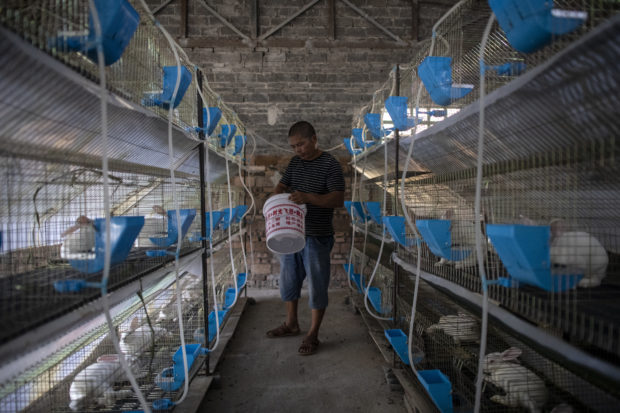China’s rat, cobra farmers feel coronavirus pain
Loudi, China — Bamboo rat farmer Liu Yanqun was just starting to make plump returns from the rodents in his farm in central China when the coronavirus broke out at the end of last year.
The killer virus has since been linked to China’s wildlife trade, with scientists saying it could have originated in bats and been transmitted to people via another mammal.
In response, Chinese authorities imposed a national ban on the trade and consumption of various animals that are used in specialty regional dishes, including bamboo rats, cobras, and civet cats.
The ban has cost tens of thousands of jobs in rural China, where the relatively cheap form of farming of wildlife had once been promoted as a way to lift people out of poverty.
“I felt like breaking down… it’s hard for me to find another job,” said Liu, who has seen his modest business farming about 800 rats in central Hunan province fall apart.
“I don’t have a clear plan on what to do next.”
Article continues after this advertisementLiu, 38, had converted the six rooms of his old family house – nestled deep in winding, mountainous roads – into the rat farm six years ago.
Article continues after this advertisementHe had just been starting to make decent returns last year and, like many other farmers, government compensation packages for ending his business have not been enough.
In May, Hunan was among the first provinces to offer compensation to encourage farmers to switch livelihoods.
Authorities evaluated farms and inventories, offering 75 yuan ($11) for a kilogram of bamboo rat, 120 yuan for that of a cobra, and 600 yuan for each civet cat.
Farmers told AFP the buyout did not meet the market value of the animals, and only covered a small proportion of infrastructure costs on their farms.
One bamboo rat farmer said the buyout covered just half his animals’ market value.
Some farmers also struggled while authorities took the time to assess livestock.

This photo taken on August 14, 2020, shows bamboo rat farmer Huang Guohua feeding the rabbits he raises after being forced to give up his bamboo rats business, in Shaoyang in central China’s Hunan province. – The COVID-19 coronavirus has been linked to the eating of exotic animals, with scientists saying the killer virus could have originated in bats and been transmitted to people via another mammal. In response, Beijing said it would step up food safety at food markets and slapped a national ban on the trade and consumption of certain animals. (Photo by NOEL CELIS / AFP) / TO GO WITH China-health-virus-agriculture-economy-poverty, FOCUS by Beiyi Seow
“We couldn’t kill them or sell them,” said cobra farmer Li Weiguo, 61, adding that many of his reptiles had died by the time the authorities came for them.
“I had over 3,000 snakes but only received compensation for 1,600 or so eventually,” he said.
‘Crying inside’
China’s clampdown on exotic animal farms has affected nearly 250,000 jobs, with businesses unable to sell animals worth some 11 billion yuan, a state media report said last week.
With compensation barely covering their investments, farmers told AFP they were struggling to repay debts with little capital to start new ventures.
“All the money (for my business) came from loans… and friends and relatives. I have no means to repay them and they ask me regularly these days,” said Li, the cobra farmer.
Another bamboo rat farmer, Huang Guohua, said he had been left with more than 400,000 yuan in debt.
“Last year, I had plans to expand the business… but the coronavirus outbreak caused us to suffer huge losses,” said Huang, 47.
His plan was to triple the scale of his farm, but the money he poured into infrastructure has gone down the drain because of the wildlife ban.
“I was crying inside,” said Huang, who now raises rabbits and chickens.
China has set an ambitious target of eradicating extreme poverty and building a “moderately prosperous society” by the end of 2020.
But the pandemic fallout has made such a goal increasingly hard to achieve, with China’s economy contracting 1.6 percent year-on-year in the first half of 2020.
Even before the coronavirus dragged economic growth, more than five million rural Chinese lived in poverty – defined by the government as surviving on less than 2,300 yuan ($326) a year.
“With the epidemic this year, we are returning to poverty – and to a worse state than before,” said Huang.
For more news about the novel coronavirus click here.
What you need to know about Coronavirus.
For more information on COVID-19, call the DOH Hotline: (02) 86517800 local 1149/1150.
The Inquirer Foundation supports our healthcare frontliners and is still accepting cash donations to be deposited at Banco de Oro (BDO) current account #007960018860 or donate through PayMaya using this link.